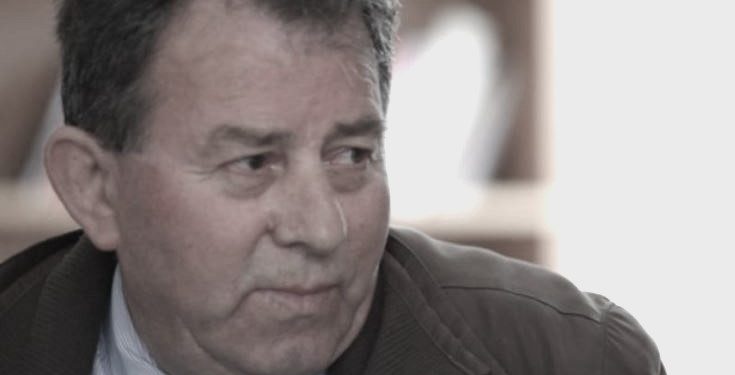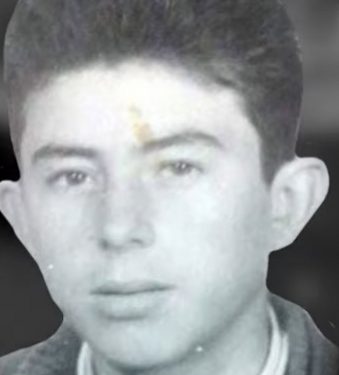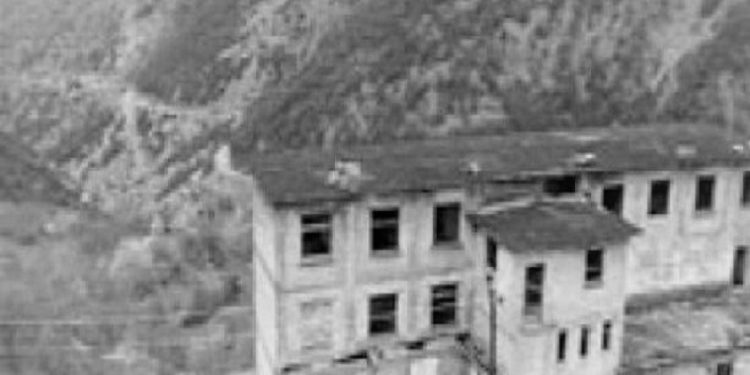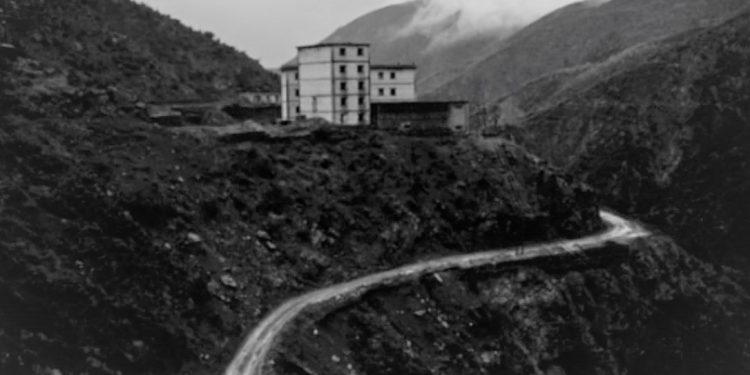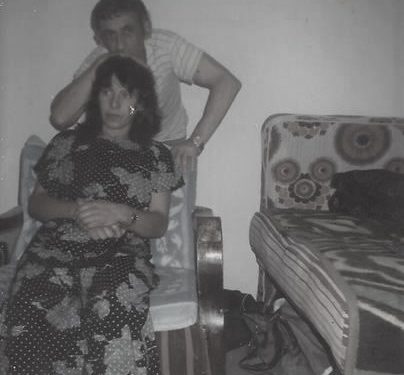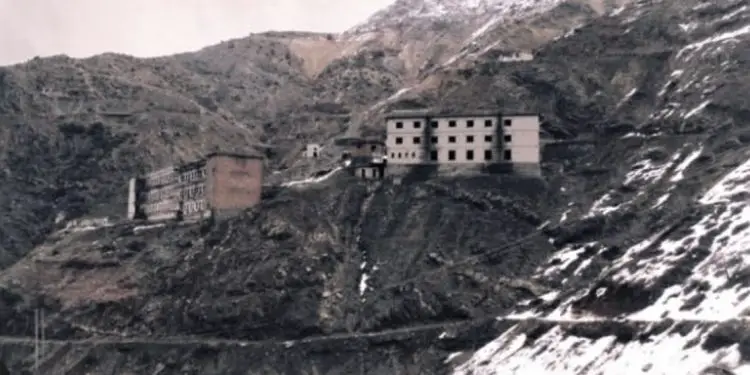By Shkëlqim Abazi
Part thirty-seven
Memorie.al / I were born on 12. 23. 1951, in the black month, of the time of mourning, under the blackest communist regime. On September 23, 1968, the sadistic chief investigator, Llambi Gegeni, the ruthless investigator Shyqyri Çoku, and the cruel prosecutor, Thoma Tutulani, brutalized me at the Branch of Internal Affairs in Shkodër, they split my head, blinded one eye, deafened one ear, after breaking several ribs, half of my molar teeth, and the thumb of my left hand. On October 23, 1968, they took me to court, where the pitiful Faik Minarolli gave me a ten-year political prison sentence. After half of the sentence was cut, because I was still a minor, sixteen years old, on November 23, 1968, they sent me to the political camp of Reps, and from there, on September 23, 1970, to the Spaçi camp, where on May 23, 1973, during the revolt of the political prisoners, four martyrs were condemned to death and executed by firing squad: Pal Zefi, Skënder Daja, Hajri Pashaj, and Dervish Bejko.
On June 23, 2013, the Democratic Party lost the elections, a process more than normal in the democracy we aspire to. But on October 23, 2013, the General Director of the “Renaissance” government sent Order No. 2203, dated 10.23.2013, for the release from duty of a police officer. Thus, Divine Providence was interwoven with the Neo-communist “Renaissance” Providence and, precisely on the 23rd; I was replaced by, no less and no more, but the former Security operative of the Burrel Prison. What could be more significant than that?! The former political prisoner is replaced by the former persecutor!
The Author
SHKËLQIM ABAZI
R E P S I
(Forced Labor Camp)
Memoirs
The Professor’s Discourse on Hunger
“Through hunger, endless wars have been stimulated; it has served as the source of epidemic diseases, of mass extermination. If you refer to human history from early times, you’ll notice that many upheavals have been caused in the name of this plague, but people have still remained poor and hungry. Emperors and kings, democrats and republicans, capitalists and communists, demagogues and charlatans, in the name of the fight against this scourge, have seized the peaks of power, but the situation has not changed. The destitute still die as a result of hunger. The roots of this misery must be sought in the political systems, and in those who rise to power in the name of equality, and in the greed of individuals who, by any means, seek to accumulate more and more capital. Today in the West, a host of politicians, economists, sociologists, demographers, philosophers, humanists – that is, all those who operate in the spheres of human personality and mentality – have understood the cause and strive to find the most effective cure.
Inspired by John Locke’s theory, they have consolidated the foundations of the consumer society, a form of capitalized humanism, where material goods are distributed based on merit and work, where they widely apply social assistance for those in need, which has led to the mitigation of the hunger phenomenon. The opposite is happening in the other part of the world, where economic policies are based on extremist materialism, on the Marxist theory of surplus value, and where class antagonism is firmly entrenched. As a result of the struggle of opposites, millions of victims are counted due to hunger, politico-economic, and ethnic mistreatment. I am talking about the countries that supposedly claim to build the new socialist society, where misery, poverty, hunger, and the diseases that stem from it wreak havoc, where infant mortality from lack of food is at alarming levels, where the average age of the population, instead of increasing as a result of the modernization of technology and the advancement of medical science, has stagnated, and unfortunately, in many places, there is a drastic decline…!”
He continued with this terminology that I was hearing for the first time. To be honest, I understood that he was speaking Albanian, but I couldn’t grasp what he was trying to say. Many terms, theories, and names of philosophers I had never heard before, and it seemed to me that they belonged to another, unknown planet. That guttural “rr” made the content of this discourse even more mysterious. Nevertheless, it seemed interesting, and I acknowledged the wise man from Dibra: “Indeed, in his case, Uncle Sherefi was not mistaken; he deserves the title!” When the debates subsided and the conversation returned to its usual course, he fell silent. He listened to what the others were saying, and rarely answered when asked. I took advantage of a moment of silence to ask him where he was from; he answered briefly: – “I’m from Libohova, my name is Hilmi Leka.” With that, the meal ended, because the hissing of the snakes and the shouts of the crier interrupted it. The time for roll call had arrived. As always, we lined up and went through the interview of misery, before the guard officer and the sergeants. Since days off were quite rare, everyone left to carry out their personal obligations.
The ‘Pjacë’ and the Dyli Brothers
“I was placed between the Dyli brothers, and we started walking in circles, along the sixty-meter length and eight-meter width, which we called the ‘square’ (shesh) and which Shyqyri Gruda from Shkodër called the ‘pjacë’ and affectionately remarked: ‘Now, we’ve come out to the pjacë to hunt pheasants (gjuajt fllanxa).’ Of course, I and many others did not understand what Shyqi meant by this expression, so some time later, I asked him for the real meaning. Shyqi explained the meaning to me with these words: – ‘Have you noticed; when we walk around the yard, everyone goes about their own business?’ – ‘Of course, I have!’ – I replied. – ‘Well, we all speak loudly, trying to be louder than the next person; but in the corners sit the spies, just like hunters in ambush, waiting to hear the whispers! They, then, have come out ‘to hunt pheasants!’ Therefore, dear friends, don’t whisper anymore, but raise your voice as high as possible, to scare the spies… sorry, the pheasants!'”
“When I heard this explanation, I laughed until my stomach hurt, and a cough nearly took my breath away. In this kind of ‘pjacë‘, with me in the middle and a Dyli brother on each side, we walked this field where groups of twos and threes were doing the same thing. The clatter of the wooden clogs and the high tones of the talking gave the feeling that one was in the middle of turmoil. – ‘O Çimo, I’ve been gaining weight for a month!’ – Muharrem’s boisterous voice echoed in my ear. Then he stood up, more exalted: – ‘Bravo, lad, you’ve saved our face, bless the qyrek!’ I felt him take a deep breath and burst out: – ‘You must be quite the scourge, you hear! Now I see it, the lesson wasn’t lost on me!’ – He boasted. – ‘But, how you paid back that son-of-a-bitch…! Why, what did the pederast know, we have boys, you hear, my father! Who will plough both his mother and his father?’ – the courageous monologue of the hot-tempered Rremo continued.”
– “Enough, Rremo, now we have to keep the boy away from trouble…” – Rizai interrupted him. – “Shut up, you hear!” – The younger brother jumped at his throat. – “With your moralizing, you’ll end up being their friend! Why, do they understand, the way you speak! No, my father, no, only the stick works on this kind of people! With the decent one, be decent, with the wicked one, be wicked! That’s the way, the stick that kind of person is made for it! Did he come out of heaven, my father! Come on, you have your brother, don’t worry about…” – “But wait, Rremo, let’s stop and ask the boy how he is!” – “Look, the world’s son has been in the dungeon for a month, and you go on about the stick, and the qyrek! When Dom Mark came out, he told us that you also went through another ordeal?” – He turned to me. – “Yes, the ordeal caught the priest too!” – I started to explain. – “No, no, it wasn’t as meaningless as you make it out to be!” – Muharrem intervened. – “That H.M., he proved to be a man, he shamed his whole generation! In his stead, you took the heat, but this is where men are divided, you hear…!”
– “But come on, Rremo, they are not all made of iron, the poor man is made of flesh and blood, one endures and one doesn’t!” – The older brother tried to soften the anger of the younger one. – “Brother, I don’t understand you at all! Why, were the others born from a cow? They are also flesh and bones, like everyone else! No, my father, no, just says they are weak farce! That’s all there is to it, my dear brother!” – Rremo agreed and shook his rough hands, with clenched fists, as was his habit. – “Forget what Rremo says, listen to Zaka!” – Uncle Rizai turned to me, calm as ever. – “God, my son, has distributed strength and temperaments in this world; he has made the lion, but he has also made the mouse; one lives like a king, the other down in the dirt; he has made the eagle, but he has also made the frog; one lives in the mountains, the other in the canals; and yes, he has made the mule, and he has made the donkey; the mule with one kick climbs Tomorr, the donkey with two baskets will remain in your hand. Do you understand now, how the Great God has arranged it, to which we should be grateful?”
“I was amazed by this wise man, which even without schooling, with his reason and excellent eloquence, was not inferior to the poets! Where he found such striking figures of speech, which even writers would envy, and then the Olympic calm with which he presented the problems, gave this old man the appearance of a biblical patriarch. He was the antipode of his younger brother, Rremo, a great-hearted but quarrelsome and reckless man, who caught fire like a Gypsy’s rifle. After spending time with them and becoming better friends, I gave those nicknames: Rizai “The Brain” and Rremo “The Stick”. Of course, after laughing heartily, they accepted my harmless jokes without discomfort. Undoubtedly, they were the model of unconditional love and completed each other. I respected them like my parents; I would buy Rizai’s flawless brain, and Muharrem’s unflinching bravery, when I needed it. They also loved me very much, helped and respected me limitlessly, so much so that I felt like a personality among them, with two bodyguards, one for the brain and the other for the stick.”
The Amanet (Bequest) of Emini
“Before lunch, Hilmi the ‘professor’ came to us. He greeted everyone and invited me to go outside for a bit. I went down the stairs, and we went out to the yard. – ‘Now we’re going to the depot, because I’m going to hand over the amanet (bequest)!’ When he mentioned the depot, I remembered the limping man, Emin the depot keeper. I scolded myself: how had he slipped my mind? ‘But he didn’t even show up to meet me when I came out of the dungeon!’ I excused myself for this oversight. ‘Maybe he didn’t find out!’ I also excused him. – ‘At Emini’s? – I asked. – In the depot.’ – ‘But Emini is not there anymore!’ – ‘Why did they remove him…?!’ – ‘No, why! He was released ten days ago!’ – He interrupted me. – ‘I’m happy for him!’ – I expressed my satisfaction when I learned this joyful news. – ‘We were all happy that he made it to that day!’ – the guttural ‘rr’s seemed to gurgle in the voice of the man with the mole. – ‘He is precisely the one who left the amanet that I will fulfill.’ I felt relieved.”
“I should have expected the gift from him, but in the dungeon, drowning in my own troubles, I had missed the date; in fact, to be honest, Emini himself had completely slipped my mind. However, I was happy about the fact that after so many years in prison, he had the opportunity to rejoin his family. I remembered my meeting with him, the sincere words he had spoken in the infirmary. I especially recalled his complaints about the dark fate awaiting him in internal exile, in the swamps of Myzeqe. I felt that his phrase was still ringing in my ears: ‘I have a month or so left, but where will I go, internal exile awaits me, where they have sent my people, in Myzeqe!… In this miserable state I’ve ended up in…!’ I fell deep into thought: ‘In internal exile, but at least you are with your own!’ I remembered answering the person who wasn’t present, but in fact, I had affirmed this to myself.”
– “Why are you thinking?” – Hilmi asked me. – “I don’t know what that unfortunate man reminds me of, as if he is inviting bad luck?” – I replied. – “You’re wrong; Emini is one of the most honest people I have known. For so many years, he maintained a manly stance! Ultimately, I would say he is one of the most positive characters.” – “I wasn’t talking about that; I simply feel sorry for him, because he deprived himself of what he left for me! – “No, you’re wrong again, it seems you didn’t know Emini!” – “I truly didn’t know him! Exchanging a few words standing up and some pity in the infirmary can’t be called acquaintance, right?” – “Of course, you are right. But for an individual with principles, to whom the material meant nothing, an unwavering spiritualist and idealist like him, there must have been an undeniable reason. He did not lack the intellect to weigh the people around him, nor the circle of friends that surrounded him, whether here in Reps or elsewhere in the other prisons, but his purpose must have undoubtedly been special, which is why he pointed precisely to you.”
“While talking, we arrived at the depot door, where a man with a moustache a-la-arixhinjçe (Gypsy style) was leaning against the frame. – “Hello Refat, how are you? Any news from the family?” – Hilmi asked him intimately. – “Thank you, professor; I’m well, praise God!” – Refat replied with a smile, his moustache hanging down to his chin, giving his dark face the appearance of a horse-trader, and then he turned to me. – “And where is this young man from?” – “From Berat!” – I replied, even though I wasn’t asked directly. – “O professor, is this the one Emini told us about?” – He addressed Hilmi. – “Yes Refat, this is the one himself! That’s why we came.” – “Yes, I have them ready!” – He went inside, where he moved something from a shelf. After a while, he came out with a sack of burlap, with a label sewn on the visible side, clearly showing the name Emin Shehu. He handed it to Hilmi and went back inside a second time. He reappeared, but this time he was holding a bundle in his hands, which he extended to me. – “These are for you!” Meanwhile, Hilmi handed me the sack: – “These are also yours; put them in your spot!” But I didn’t have a spot because I still didn’t have any belongings. I first thought of putting them directly on the shelf from which they were taken, and then I changed my mind. The curiosity to see what the sack contained pushed me to change direction. I threw the sack over my shoulder and the bundle in my hand and headed for the private kitchen. I wanted to empty it, to see what they had left me, even though gifts are not valued. I could hardly wait to enjoy my new inheritance, obtained with a strange will: bequeathed by a newly acquainted person whom I would never see again!”
“I untied the knot of the sack; a frying pan handle popped up over the others. I took it out. It was black scum, inside and out. I brought it closer to examine it; on its sides, I noticed dozens of hieroglyphic scribbles, carved with a nail or a knife tip, but because the layer of grease was an inch thick, they were indecipherable. I set it aside, ‘I’ll look at it sometime when I have time,’ and turned back to the mouth of the sack, to look deeper. I widened the opening with my fingers. In disorder, clinging to each other, were crammed pots, aluminum basins, some aluminum and wooden spoons, and finally, another frying pan, but this one was made of un-tinned copper. I examined all of them; on their sides were hundreds of letters, dozens of names of people, places, and dates, but almost illegible, as if extracted from ancient tumults. I made up my mind, that someday when I had time, I would clean them with sand and try to decipher the hieroglyphs of the communist era.”
“I plunged them back into the sack and tied the knot. I untied the bundle; on top was a flannel shirt, adapted as a blouse, slit at the neck, under it two other shirts folded with the same care, further down two pairs of trousers, a prison suit, and finally, a cotton coat, and two white hats. I separated the coat. The others I re-gathered in the cloth, tied them, and set them aside. I put it on; strangely, it fit me perfectly, as if it had been cut to my size. I felt my body warm up. Instinctively, I put my hands in the pockets to warm them, when my fingers touched a letter. I took it out and unfolded it; it was a double sheet torn from the middle of a notebook, filled on both sides with wide, thick handwriting. I sat on the bundle and began to read.”
Emini’s Letter and the Amanet’s Condition
“Unfortunately, during the years in prison, I was transferred several times. In the moves from one camp to another, I couldn’t save that piece of paper. It was lost during the occasional checks, but the content remains in my memory, which I will present in a few lines, as I recall it today. It started with ‘Dear Shkëlqim’ and continued with a description of his first sentence, as a minor. Then it spoke about the history of his re-sentencing after escaping from Rinas and the hardships he had to face after this act; it extended with the details of the transfers from one prison to another and from camp to camp, about the history of every item he was leaving me as an inheritance, and the life stories of their first owners. After this, followed an endless series of advice, for example: how I should behave, how to choose friends without making mistakes, how to react in specific cases, etc. It concluded with words that I will quote verbatim, at least as I remember them:
‘Now after so many years, my turn has come to be released, something I hadn’t thought about for a long time! I wish you the same! But during the long years in prison, I inherited these items from fellow prisoners who were released, which I am leaving to you! The reasons why I am leaving them to you are two, which are also conditions: 1 – When I was sentenced, I was the youngest in the camp. As such, I enjoyed the love of the older men who saw their son in me, and they advised me on how to behave and how I should spend the years in prison. If I had listened to them, I would have been released on time, and maybe we would have never met! But I didn’t listen to their brain; I listened to my heart, and I paid for it. When they completed their sentence, as the youngest, they left the belongings to me, but with the amanet that when the day came for me to be released, I should leave them to the youngest one again. That’s what I’m doing!
2 – The day I met you, I found myself in the time of my first sentence; at the same time, I noticed a stable character. When you were sentenced to the dungeon, my faith wavered a bit, but when Dom Mark told me about your attitude in the cell, I changed my mind and said; who better than you to fulfill the amanet? And I decided to classify you as the winner. So, the condition is this: These belongings will remain inside this door, and when your day of release comes, and may it be soon, these items must be donated to another person who meets the conditions that I think you met.
P.S. I am leaving everything with Refat Arixhiu, who replaced me in the depot, but the guarantor is the philosopher Hilmi Leka. You don’t know him, but he will meet you himself. I am also leaving a blanket for you with Refat. I embrace you amicably, even though we were not destined to meet physically! May God help you and may you be released as soon as possible, with a clean slate!’ E. SH. (signature). I never met Emini again in my life, neither in prison nor in freedom, but I fulfilled the instructions and the amanet he left me on that piece of paper, perhaps not as strictly as he advised, but I surely donated them to the neediest, his compatriot G. Medolli, who would be sentenced and re-sentenced several times, until close to the nineties. But this belongs to other chapters.”
The Final Lines
“The communist plague spread like an epidemic in almost half of the world’s most destitute countries. To guarantee survival, they perfected demagoguery, as if it were the system that would improve the socio-economic situation of the strata in need. As a means to implement the baseless dogma, they chose, developed, and applied the struggle of opposites. Among us, class hatred reached its peak; it spread with the speed of concentric circles. The struggle within Albanian society started from the marital bed, where the wife spied on the husband; it entered the family, where the son or daughter spied on the father and mother; in the tribe, in the village, in the neighborhood, in the region, in the small town, in the city, in the province, in enterprises and agricultural cooperatives; in schools and universities, in stadiums and military units, and even in kindergartens and nurseries; in the south and in the north, in the east and in the west; in race and ethnicity, and even within the bosom of their own Party; in a word, it infected every cell. Everywhere, spying and censorship reigned; they stimulated silence, and silence incited violence. Under the pretext of the war; “everyone against everyone,” the endless paranoia of the Main Leader was transmitted to the Party-State; as a result of mistrust, the plague broke out, its effects fell on everyone without distinction; the elderly, the young, men, women, even children closed their mouths. Silence, silence, and silence! Whoever dared to speak, they found their place; thus, no one said what they thought, but imposed censorship on themselves: ‘Better a sewn mouth than a cut head!’ When no one was left to speak, they started punishing even silence.”
“To maintain the quotas of political sentences and to keep the fuse of the ‘class’ bomb lit, they filled the prisons with opponents, but also with ‘pseudo-opponents,’ supporters. They sentenced indiscriminately, both old and new ‘enemies.’ Woe to him who got caught in the wheel! I found in the political prisons, from the old anti-communists, involved in several opposing parties, to the most fanatical communists, who even where they were ‘shitting in a tin can,’ did not believe they were in prison as a result of paranoia, but judged themselves victims of a human error and hoped the error would be corrected soon! In fact, these incorrigible bearers of this perverse mentality went so far as to, for every national or party holiday, birthday or commemorative anniversary, wish long life to the Main Leader and his servants. There were among them, self-proclaimed revisionists who saw salvation in the Soviet Union and the Eastern Democracies and, who from the prison, fought with excessive zeal against American imperialism and the Western European bloc.” Memorie.al




